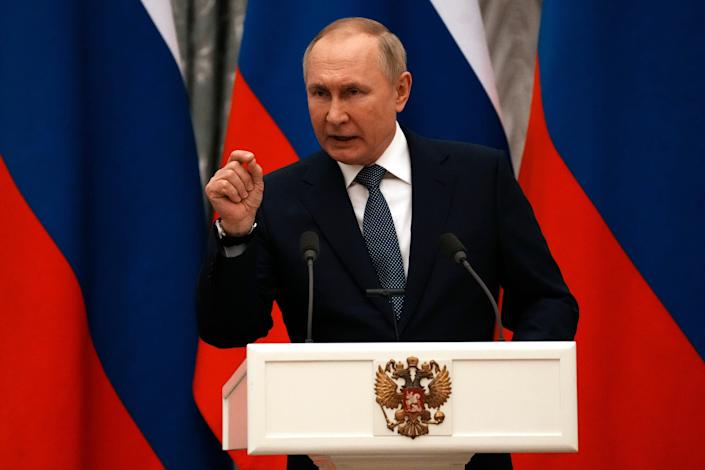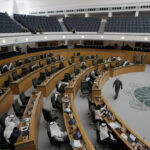Russia launched a brutal, unprovoked and senseless aggression against Ukraine in February. The resulting Western response has been resolute, swift and expansive: More than a thousand people and organizations have been sanctioned, and wide trade and financial sanctions have been put in place.
The war is now in an acute phase, but a ceasefire may be possible, as well as a resolution that results in an end to open hostilities.
However, if Russian President Vladimir Putin is left in place, his modus operandi will not change, and he very likely will launch a new, possibly better prepared, military aggression against a neighboring country that will further undermine international order and bring us closer to a nuclear catastrophe.
Putin’s destruction of Mariupol: That’s what it looks like when a cruel and unhinged bully doesn’t get his way
A removal of Putin, barring some “deus ex machina” scenario, will require a combination of dissent in the Russian business and political elite together with strong dissatisfaction in the wider population with the authorities. That’s why it’s important to drive a wedge between Putin and Russia’s elites. In order to achieve this goal, we need a more nuanced approach to Western sanctions.
Ease sanctions – with conditions
Sanctions freeze assets and impose travel bans on high-profile Russians. The question is, should there be an “off-ramp” – a way to ease sanctions on individuals who condemn the war, contribute to Ukrainian humanitarian effort and put themselves in opposition to Putin’s regime? I would say “yes,” with three conditions.
To take a yacht or not? Why it may not be legal to seize Russian oligarchs’ property.


First, we should not lighten sanctions imposed on anyone who has perpetrated crimes against humanity, war propaganda and human rights abuse.
Second, we should ease, not fully lift, sanctions on people who contribute a portion of their assets to special funds directed toward repairing the damage done by the Russian invasion. It’s one thing to freeze assets; confiscating assets and using a portion of them for humanitarian purposes in Ukraine, as is often proposed, is a much more difficult legal proposition. Such confiscations can be mired in courts for years, as in the decade-long case of Pavlo Lazarenko, the corrupt former prime minister of Ukraine. That’s why this would be structured as a contribution, and not a confiscation.
Sanctions aren’t enough against Russia, Putin: Stop buying oil, gas to protect Ukraine.
Third, we should not lift sanctions until the individuals subject to them clearly condemn the senseless war, and side with Ukraine and Western coalition. This will motivate monied Russians to seek ways to change Russia’s totalitarian political order. It isn’t realistic to expect oligarchs to influence Putin’s regime directly, as Putin listens only to his close circle of security people. But most of the individuals subject to sanctions are influential and resourceful. It’s better to have them as allies in the goal of removing Putin’s regime from power.
Compromise now or later
Creating an “off-ramp” – a path for easing of the sanctions, in a clever way – would weaken Putin’s position, while freeing up billions of dollars to alleviate suffering in Ukraine. People who have been sanctioned have undoubtedly benefited from Putin’s kleptocratic regime plagued by favoritism. But if the goal is deconstruction of his regime, which is a great menace for the world, it is in our interest to supply an incentive to those who oppose brutal totalitarianism.
Freezing all assets and denying oligarchs access to the Western countries without a clear way out may push them further into Putin’s fold, without helping our strategic goals. We might consider creating an international steering committee – composed of representatives from the United States, European Union and United Kingdom – to jointly review the sanctions and oversee the “off-ramping” procedure.
Navalny from prison: Corruption flourishes when there’s disregard for human rights
Diluting sanctions involves compromise. But attracting support from those who know how Putin’s regime operates and providing them a clear motive to dismantle it, may help the West avoid much more uncomfortable compromises with Putin’s regime in the future.
Vladimir Ashurkov is the executive director of the Anti-Corruption Foundation and long-term ally of imprisoned opposition leader Alexey Navalny.
You can read diverse opinions from our Board of Contributors and other writers on the Opinion front page, on Twitter @usatodayopinion and in our daily Opinion newsletter. To respond to a column, submit a comment to letters@usatoday.com.
This article originally appeared on USA TODAY: Want to undermine Putin? Ease Russian sanctions tactically.




